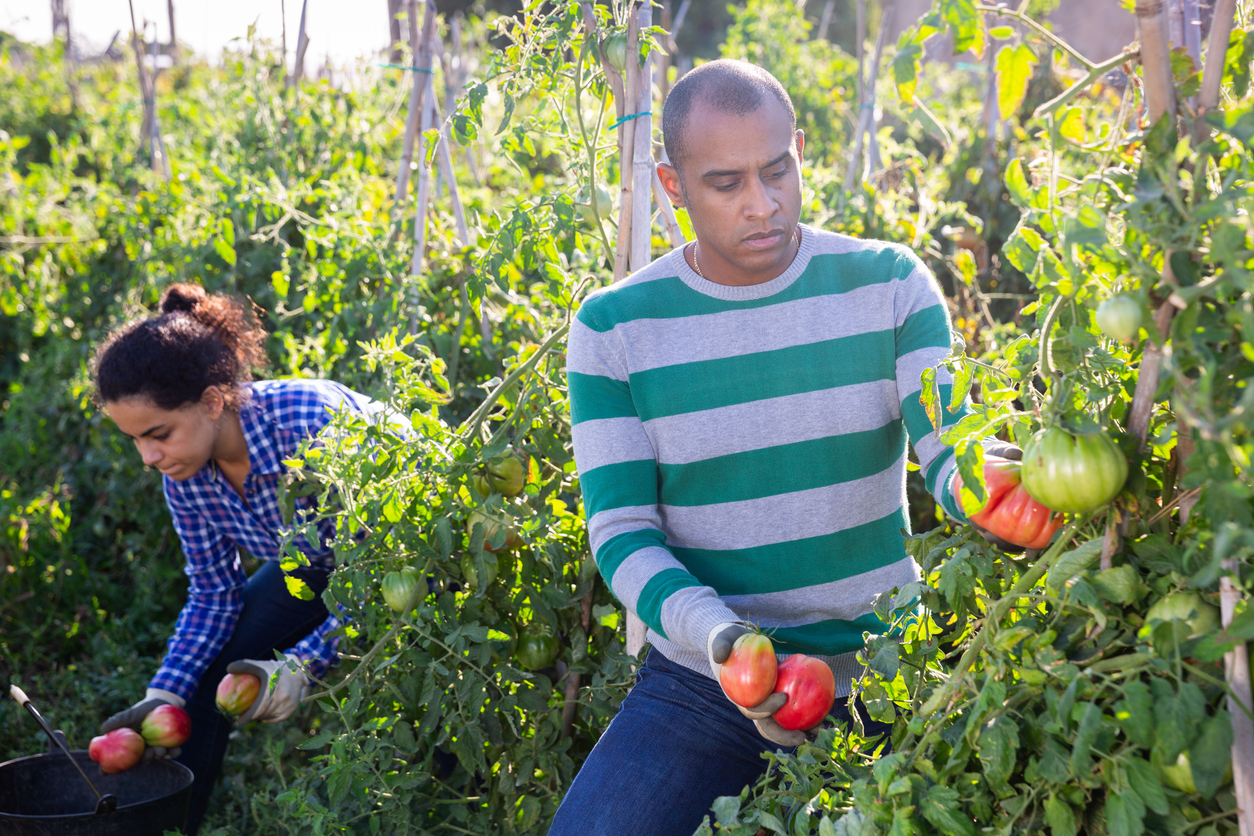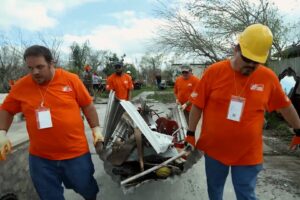Communicating and connecting through food
Giving back by growing, delivering, cooking and serving food helps you communicate better.

Karen Vahouny is the business fluency coach for Ragan’s Communications Leadership Council. As a former corpcomm VP, PR firm partner, and now owner of her own consultancy, Vahouny’s executive and investor relations experience has complemented her role in teaching at George Washington University’s Strategic PR Master’s program.
Reading Ragan Editorial Director Justin Joffe’s piece about shared humanity, this line really hit home:
“At this inflection point, I find peace and energy in the shared sentiment that people are not their governments.”
My next thought: Food.
I’m sure the word sounds strange in relation to this crisis, but food is a connection point; it brings us together. And when there’s a crisis like the one in the Middle East, people need food and they need to stay connected.
Consider chef, restauranteur and one of my heroes: José Andrés. Following the devastation in Puerto Rico from Hurricane Maria in 2017 and frustrated with the U.S. government’s response, he got on the first commercial flight to San Juan and mobilized a team of local chefs and World Central Kitchen (WCK) volunteers. Over time, the WCK team engaged about 19,000 volunteers and served close to 4 million meals around the small island.
The birth of WCK occurred seven years earlier, when Andrés and his team traveled to prepare and provide food for Haiti earthquake victims. Since then, volunteers have provided meals for the victims of numerous major natural disasters around the world. It also broadened its focus to support refugees arriving at the U.S. border and families affected by the war in Ukraine.
And right now, WCK volunteers are feeding families in Israel, Gaza and Lebanon.
After reading Joffe’s piece, I went to the WCK website and made a donation designated for the people affected by the conflict in the Middle East.
The needs are so great: shelter, medicine, transportation, protection. So why donate to a charitable organization that provides food? Food is a basic need, yes, but when you’re in a position to grow or buy food, cook it, serve it and share it – when you have the chance to make eye contact with the people you’re serving or breaking bread with – it’s a feeling that’s hard to describe. A melting pot of nurturing, gratitude and humility.
My association with food as a way to help and connect with others began, in large part, because of my husband’s father, Bob Mondloch. He died of a heart attack at the age of 46 (before my husband Dan and I got married) and was instrumental in starting a homeless shelter in Alexandria, Va. (later named Mondloch House in his honor and expanding to include a group of shelters and transitional housing under the name New Hope Housing).
One of the first volunteer projects I remember was helping organize the shelter’s large kitchen pantry. Later, Dan and I added other activities, many food-related, such as making Thanksgiving food baskets and delivering platters of homemade cookies to the residents during the holidays.
Serving food
An even more gratifying activity has been preparing food, serving brunch to families at one shelter and serving dinner to residents of another during the Christmas season. Some have mental health issues, some are immigrants and looking for jobs, and others have just run into tough times. I’m grateful to talk to each one as we serve the food (sometimes a conversation and sometimes just a question like, “With cheese or no cheese?”) The opportunity for eye contact is really what offers that deeper sense of connection.
More recently, we’ve been volunteering with another area nonprofit to provide dinners on Christmas Eve to the homeless in a nearby town. The first time, the already-prepared food boxes included nothing to reflect the fact that it was Christmas – no cookies or treats. So after that, we baked a number of different treats (each wrapped individually, since we started doing this in the first year of the pandemic). Choosing what cookies and bars they wanted often led to comments about food, words of thanks, and smiles.
Growing food
Every February for the past decade or so, we’ve gone to Puerto Rico to get recharged by its warm sun and even warmer people. We rent bikes (no car) to get around, carry groceries in our backpacks, and stay in small rental apartments where we have a greater chance to meet locals than if we stayed in hotels. It’s from these experiences that we’ve met several Puerto Rican residents who speak about José Andrés, and what WCK did for the island after the hurricane, with reverence and love.
Most people did not have generators and went for months and months without power (which meant no refrigeration, no ice, no air conditioning, etc.) I remember when a friend sent me a photo of herself holding up a cold beer she’d bought at a local market – her first in about six months!
WCK provided the jumpstart, but Andrés recognized that a huge problem was the island’s reliance on imports; 85% of the territory’s food was imported from the U.S. That was the impetus for the launch of WCK’s Food Producer Network. Grants, funding, networking, and training encourage and support new farmers and revitalize the operations of others. The purpose is to build food security, resilience and sustainability.
Tadilka Rivera is one of the farmers receiving WCK financial support and training. She’s also my “boss” when I volunteer on her farm in Camuy, about an hour west of San Juan.
Like many island residents, Tadilka lost her job after Hurricane Maria. A small plot of family land offered a fresh start, and she began to remake it into a farm (which she’s named Microfinca). We help her out, doing everything from using machetes to remove brush to weeding, planting and harvesting. It’s hard, hot work – with a mid-morning break in the shade. Beyond her making us breakfast using fruit from her farm (my favorite: banana pancakes!), we have built a connection and a friendship. This winter will mark our fourth consecutive year, with the exception of the 2021 “Covid year.”
The Food Producer Network now supports three other locations and has amassed some impressive results. More than 300 grants and loans, and half of the recipients are led or co-led by women. Over 1,350 volunteers. The average productivity increase after one year of support: nearly 70%.
“Food is essential to life every single day, all over the world—and it is more important than ever in a crisis,” WCK notes on its website.
“Not only is a thoughtful, freshly prepared meal one less thing someone has to worry about in the wake of a disaster, it is a reminder that you are not alone, someone is thinking about you, and someone cares. Food has the power to be the nourishment and hope we need to pick ourselves back up in the darkest times. All of this work is made possible by working with communities wherever WCK teams go—over and over again, WCK sees the best of humanity show up in the worst of times.”
I believe that sharing food by volunteering can become an even more potent way to bring our world together.
Food offers a path to finding common ground. It brings us together. Even the language barrier doesn’t get in the way of growing, serving and eating food together with people you don’t know. Food is a “binder” that builds bridges and connections.






